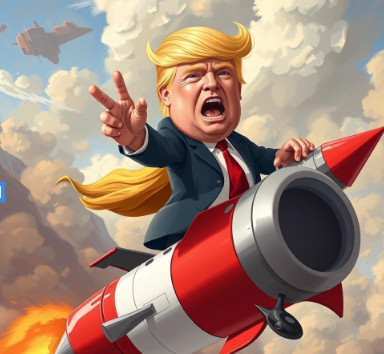$RSX $SPY $BTC
#Russia #Ukraine #Trump #Putin #Ceasefire #Geopolitics #Markets #Investing #Oil #Crypto #Stocks #Economy
U.S. President Donald Trump and Russian President Vladimir Putin are set to participate in a high-level discussion regarding a 30-day ceasefire proposal for the ongoing war in Ukraine. The call, expected to take place soon, comes as tensions continue to weigh on global markets, with investors closely monitoring potential geopolitical shifts that could impact asset prices. A ceasefire, if successful, could stabilize European markets and have significant implications for commodities, particularly oil and natural gas. Russian-linked assets, such as the VanEck Russia ETF ($RSX), have been under pressure since the conflict began, while broader indices like the S&P 500 ($SPY) have experienced volatility due to uncertainties surrounding the war and subsequent sanctions. Investors are looking for clarity on whether diplomatic progress could lead to an easing of Western sanctions on Russia, which would have important consequences for financial markets.
The talks also carry broader implications for energy markets, as any resolution to the conflict could influence Russia’s fossil fuel exports, which in turn play a key role in global energy supply chains. Oil prices have surged since the start of the war, fueling inflationary pressures worldwide. A successful ceasefire could ease supply concerns, leading to a potential cooldown in Brent crude and WTI prices, which have been major drivers behind surging costs of goods and services globally. Additionally, European economies, which have experienced significant energy price volatility due to dependence on Russian natural gas, could see some economic relief should Russia agree to stabilize shipments. The energy sector remains in focus, as traders analyze whether oil giants and alternative energy firms will benefit or suffer from any ceasefire developments. The negotiations will also impact the U.S. dollar, particularly in relation to emerging market currencies exposed to Russian and Ukrainian tradeflows, as well as inflation expectations in the Federal Reserve’s interest rate decision-making process.
From an investment perspective, markets have been highly sensitive to geopolitical risk, evident in capital flows into traditional safe-haven assets such as gold and U.S. Treasuries. Cryptocurrency markets have also reacted strongly to the war, with Bitcoin ($BTC) and other digital assets witnessing notable swings as investors hedge against fiat currency instability in conflict zones. Should a ceasefire materialize, a reduction in uncertainty could lead to risk-on sentiment, favoring equities and risk assets over safe-haven instruments. On the other hand, any breakdown in talks could exacerbate market concerns, leading to renewed volatility in global equities, bonds, and currencies. Tech stocks, which often bear the brunt of geopolitical uncertainty due to their sensitivity to interest rate expectations, remain particularly exposed to developments in the negotiations between Trump and Putin.
Beyond financial markets, the geopolitical ramifications of a potential ceasefire could redefine Western-Russian relations. If successful, it may provide a framework for easing some of the strict sanctions imposed on Moscow, which in turn could benefit Russian equities and the ruble. Conversely, if the discussions fail to yield significant progress, markets may brace for prolonged geopolitical instability, potentially leading to extended economic disruptions and heightened global supply chain concerns. As the world awaits the outcome of the call, traders and policymakers alike will be assessing the broader implications for global trade, commodities, and geopolitical strategy, particularly in an environment where economic headwinds remain a key concern for investors heading into the next quarter.











Comments are closed.